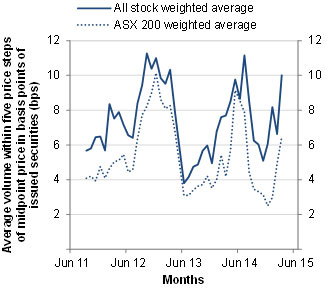Equity market data for quarter ending March 2015
For an explanation of the measures used in this release, see Information Sheet 177 Quarterly cash equity market data: Methodology and definitions (INFO 177).
Summary
Tables
Table 1 - Market characteristics - average for March quarter
Table 2 - Measures of market concentration
Table 3 - Measures of market efficiency
Graphs
Figure 1: Market share - March quarter 2015
Figure 2: Australia - Average daily turnover
Figure 3: Average trade size by execution venue
Figure 4: Dark liquidity proportion of total value traded
Figure 5: Order-to-trade ratio
Figure 6: Intraday trading profile
Figure 10: Effective bid-ask spreads
Figure 11: Quoted bid-ask spreads
Figure 12: Depth at five price steps as basis points of issued securities
Equity market data from other quarters
Summary of March quarter data
In the March quarter 2015, the ASX accounted for 82.9% of the total dollar turnover in equity market products. Chi-X accounted for the remaining 17.1% of total dollar turnover. These figures include all trades executed on order book, as well as trades matched off order book and reported to either market operator. Chi-X and ASX trade reporting both increased over the quarter compared with December quarter 2014, up 13% and 22% respectively.
Overall daily turnover in the equity market averaged $5.5 billion in the March quarter, an increase from $4.9 billion in the December quarter 2014. The weighted average quoted bid-ask spread for securities in the ASX200 index remained at 14 basis points of the midpoint price in the quarter. The weighted average quoted bid-ask spread for all securities decreased slightly to 20.8 basis points of the midpoint price.
Below block size dark liquidity represented 11.4% of total value traded in the March quarter, unchanged from the previous quarter, roughly equal to its share of the market a year prior (11%). Turnover in block size dark liquidity was 15% of total value traded, unchanged from the previous quarter.
The Herfindahl index was unchanged across the public order book and broker crossings during the quarter, showing that market fragmentation remained stable. Intraday and interday volatility was steady in the quarter at around 17% after peaking in December 2014. The overall order-to-trade ratio decreased to 7.5:1 in the quarter as both the ASX and Chi-X reported lower ratios.
Table 1 - Market characteristics - average for March quarter
| Statistics |
ASX on-order
book |
ASX auctions
|
ASX Centre Point
|
ASX trade
reporting |
Chi-X on-order
book |
Chi-X trade reporting
|
Total
|
|---|---|---|---|---|---|---|---|
| Number of trades per day (market share) |
663,261
(69.1%) |
25,594
(2.7%) |
65,949
(6.9%) |
8,898
(0.9%) |
153,096
(15.9%) |
43,616
(4.5%) |
960,414
(100.0%) |
| Value traded, $ million/day (market share) |
2,888.2
(52.3%) |
795.8
(14.4%) |
305.9
(5.5%) |
585.2
(10.6%) |
435.1
(7.9%) |
511.7
(9.3%) |
5,522.0
(100.0%) |
| Order-to-trade ratio |
6.2
|
na
|
na
|
na
|
16.7
|
na
|
8.1
|
| Average trade size, $/trade |
4,346
|
30,975
|
4,633
|
66,701
|
2,834
|
11,657
|
5,728
|
Table 2 - Measures of market concentration
|
Statistics |
March 2014 |
January 2015 |
February 2015 |
March 2015 |
|---|---|---|---|---|
|
Total market Herfindahl index |
0.43 |
0.50 |
0.45 |
0.44 |
|
Public venues Herfindahl index |
0.72 |
0.72 |
0.70 |
0.71 |
Table 3 - Measures of market efficiency
| Statistics |
March 2014
|
January 2015
|
February 2015
|
March 2015
|
|---|---|---|---|---|
| Quoted bid-ask spread, bps - All stocks - S&P/ASX 200 stocks |
20.7
14.6 |
21.1
14.7 |
19.9
13.6 |
21.4
13.9 |
| Effective bid-ask spread, bps - All stocks - S&P/ASX 200 stocks |
18.8
13.1 |
17.5
11.8 |
16.6
11.1 |
18.0
11.4 |
| Depth at best 5 price steps - all stocks, bps - All stocks - S&P/ASX 200 stocks |
7.7
4.2 |
8.2
3.0 |
6.6
4.9 |
10.0
6.5 |
Figure 1: Market share - March quarter 2015
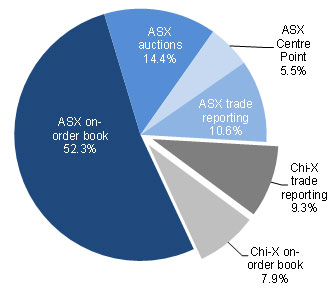
Figure 2: Australia - Average daily turnover
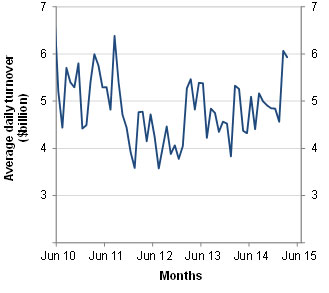
Figure 3: Average trade size by execution venue
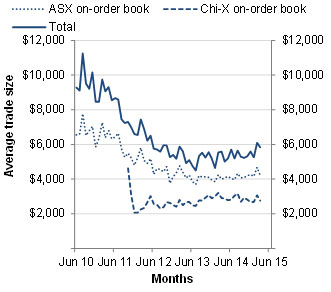
Figure 4: Dark liquidity proportion of total value traded
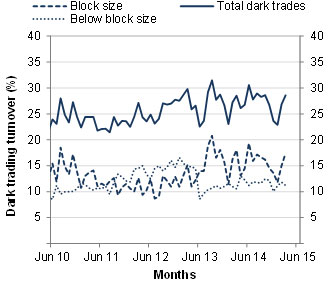
Figure 5: Order-to-trade ratio
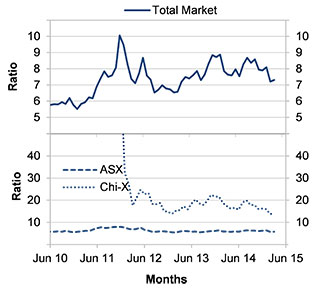
Figure 6: Intraday trading profile - March quarter 2015
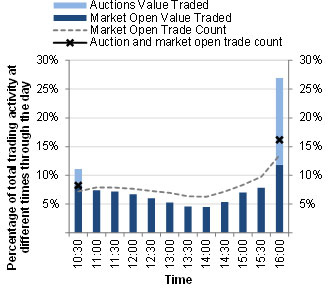
Figure 7: Intraday volatility
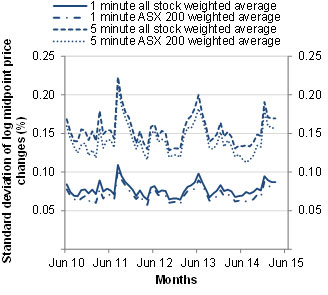
Figure 8: Interday volatility
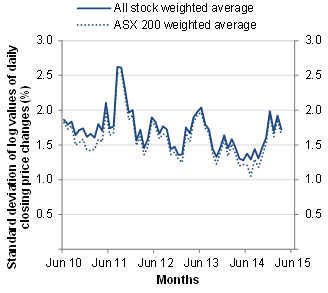
Figure 9: Herfindahl index
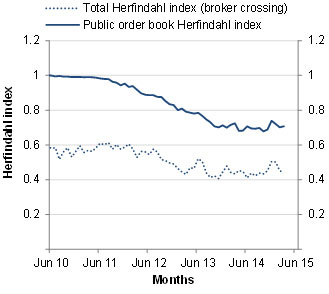
Figure 10: Effective bid-ask spreads
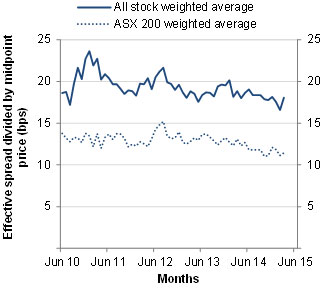
Figure 11: Quoted bid-ask spreads
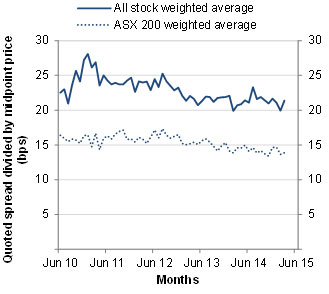
Figure 12: Depth at five price steps as basis points of issued securities
